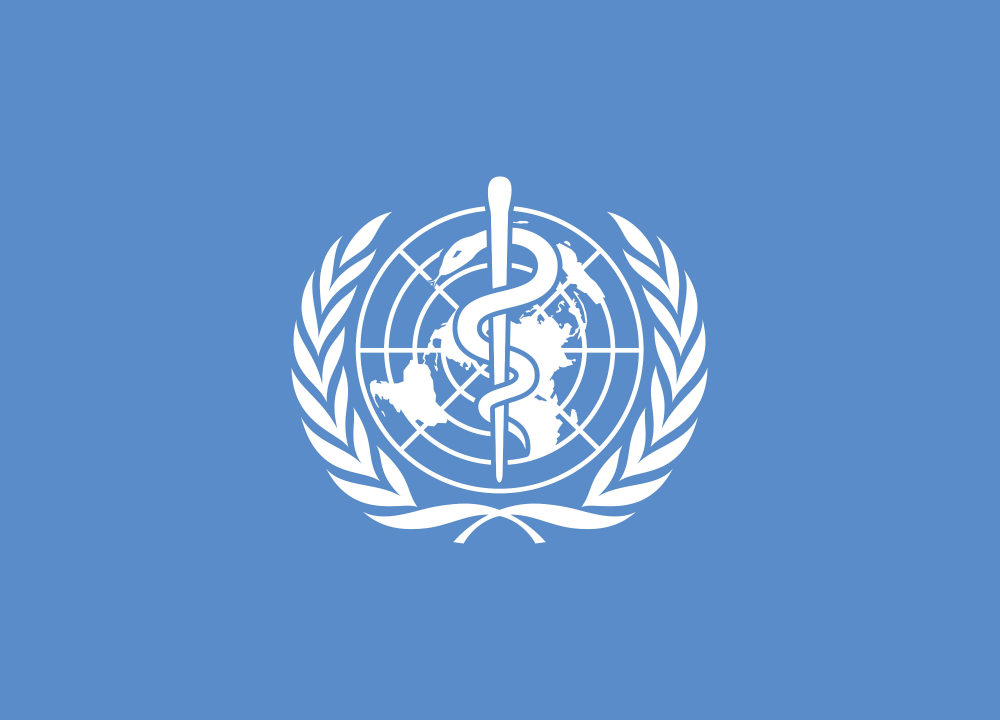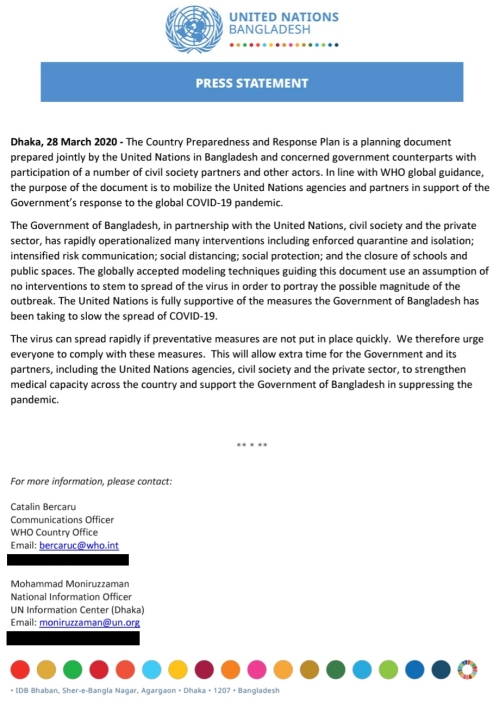United Nations interagency Covid-19 memo: Without interventions, “upto 2 million” people may die in Bangladesh
Leaked UN interagency memo led by WHO predicts “complete saturation” of the health system early in the Covid-19 epidemic and “rampant” exposure of healthcare workers in Bangladesh.

According to a leaked interagency United Nations (UN) memo, the Covid-19 epidemic could result in “between half a million [to] 2 million” deaths in Bangladesh, if immediate steps are not taken to suppress the virus. The memo, titled “Country Preparedness and Response Plan” (CPRP V1), which calls the cited numbers “astounding”, was circulated earlier this week among diplomats in Dhaka.
Bardan Jung Rana, the World Health Organization (WHO) representative in Bangladesh, has confirmed to Netra News that the document we obtained is an “interagency memo led by WHO with the [UN resident coordinator in the country] co-leading it.”
“Given the extraordinary human densities in Bangladesh, globally accepted modeling techniques and parameter assumptions forecast the impact of Covid-19 without interventions between half a million up to 2 million lives lost during the epidemic wave,” reads the CPRP memo, dated March 26th. “These figures are not surprising when considered against modeling in other countries but they are astounding and should serve as a call to action.”
The authors of the memo pull no punches and note that Bangladesh’s weak health system will see seriously ill patients, suffering from the virus and other ailments, being left untreated because of “a complete saturation of the health system early in the epidemic”. They also forecast that there will be “rampant” exposure of healthcare workers to the Covid-19 virus given the poor “infection prevention control practices, lack of PPEs [personal protective equipment], and extremely high patient densities in secondary and tertiary care hospitals.”
The CPRP memo also appears to question the wisdom of Bangladesh government’s decision to send an estimated nine million people out of Dhaka ahead of the national shutdown on March 26th, stating that this “most likely dispersed incubating and infectious individuals throughout the country […] accelerating the spread of the disease.” However, the document also notes how the exodus out of Dhaka may have lessened the Covid-19 case burden in the capital city and distributed it nationally.
The document notes that the precise number of current Covid-19 cases in Bangladesh is unknown, “but estimated to be significant given official reports, anecdotal evidence, and modelling predictions”; and, that “PPE supplies remain scattered with healthcare workers and facilities generally unprepared” for dealing with suspected and confirmed Covid-19 cases, despite recent improvements at “select facilities at the national level”.
The authors of the UN interagency memo prescribe a suppression strategy “to break transmission at [the] community level and buy time to prepare health facilities.” They call for immediate donations of $300 million to meet the “significant procurement needs to sufficiently equip and supply the healthcare system for the anticipated influx of severe and critical Covid-19 cases.”
Noting that “lockdown” alone will be insufficient to reduce the high number of Covid-19 infections in Bangladesh, and that only “suppression” of the virus is expected to ensure sufficient reduction in contact rate to blunt the epidemic, the memo includes a six-point action plan: immediate nationwide Covid-19 case searching and identification; capability assessment of all available real-time diagnostic testing facilities for deploying Covid-19 testing; urgent procurement of PPE, hospital equipments and other medical supplies; launching of nationwide healthcare worker training aimed at “improving triage, infection prevention, and case management”; risk communication targeted at communities; and, advocacy for maintaining social distancing measures.
Commenting on the measures proposed in the memo, Bardan Jung Rana, the WHO representative in Bangladesh, told Netra News, “To win, we need to attack the virus with aggressive and targeted tactics — finding cases, isolating and caring for every confirmed case, and tracing and quarantining every close contact.” He also confirmed that the action plan was “prepared jointly with the participation of the government, UN agencies and development partners.”
The UN memo, notes that the combined impact of government actions — social distancing, school, business, and public transport closure nationally — has meant that right now the “Covid-19 reproductive rate (spread rate) will be at its lowest level since [the first spread of the virus in] Bangladesh.”
Netra News recently reported on a projection prepared by a group of Bangladeshi and US-based researchers who estimated that there could be as many as 500,000 deaths in Bangladesh between March and May from Covid-19 infection. The interagency UN memo does not give a time limit to its estimate of upto 2 million deaths.●
[Update — March 29th]
Following the publication of this report, Netra News received an additional comment from Bardan Jung Rana, the World Health Organization representative in Bangladesh: “Government and health partners have been conducting strong and coordinated actions and interventions for upscaling preparedness, early detection and control measures from the very early stages of the global pandemic. The planning document itself highlights the ongoing strong efforts being conducted by the government, in support for which additional resources are being pooled in and coordinated efforts are being put in place. […] [To] to turn the pandemic around, countries need to invest in a comprehensive and blended approach. Such approach has been already been initiated by the government of Bangladesh together with the health partners and the document you are referring is the proof that these efforts are being continuously scaled up.”
The United Nations has also issued a press statement confirming the provenance of the memo cited by Netra News: “The Country Preparedness and Response Plan is a planning document prepared jointly by the United Nations in Bangladesh and concerned government counterparts with participation of a number of civil society partners and other actors. In line with WHO global guidance, the purpose of the document is to mobilize the United Nations agencies and partners in support of the government’s response to the global Covid-19 pandemic.”
“The globally accepted modeling techniques guiding this document use an assumption of no interventions to stem the spread of the virus in order to portray the possible magnitude of the outbreak,” the UN statement added.
